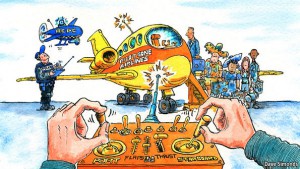June 6, 2016, by Simone Paternostro
Will Planes Be Pilotless? The Future of Commercial Aviation
News related to driverless cars is becoming increasingly popular in recent years, and these self-driving vehicles may be on the market as early as next year. Several large companies such as Google, Audi, BMW, Jaguar, Apple, Microsoft and many more, are investing in the driverless technologies that will soon provide us with our ground transportation, thanks in part to the increasing reliability of navigation systems. However, what about such self-driving technologies in the context of future air travel?

The Germanwings incident, where a plane was deliberately and tragically crashed by a co-pilot whilst crossing the French Alps in March 2015, has prompted a global debate about how many pilots are necessary aboard commercial flights. According to some aviation experts the answer might even be none.
Due to advances in sensor technologies, computing and artificial intelligence (AI), human pilots are becoming less necessary and some companies are experimenting by replacing pilots of cargo planes with robots and remote operators. Moreover, few people may know that commercial aviation is already heavily automated; modern aircraft are generally flown by computer autopilots that track the aircraft’s position using motion sensors and ‘dead reckoning’, corrected as necessary by GPS. Moreover, the deployment of new Global Navigation Satellite System (GNSS) constellations (the European Galileo and the Chinese Beidou), and the modernization of the existing ones (The American GPS and the Russian GLONASS), will increase the availability and the number of satellites-in-view (satellites above the theoretical local horizon if the earth was a perfect sphere without any hills or mountains; they are only theoretically receivable). Consequently, these systems are paving the way for new and improved (higher accuracy and reliability) navigation algorithms and techniques.
A recent survey reported that a pilot spends just a few minutes manually piloting the plane – mainly whilst executing takeoff and landing – while most of the time the computers flies the aircraft (except in case of emergencies or anomalies, in which case the pilot can take control).
However, pilots are still necessary due to the fact that flying remains very instinctive, with hands-on operations subject to limitless contingencies that require human input. The on-board computers need to be told what to do, how, when and where to do it. Pilots are continuously manipulating, operating and commanding the different aircraft systems and subsystems.
This is not to say that flying autonomously, under the remote supervision of pilots in an office thousands of kilometers away, could not bring several benefits. Firstly, there are safety implications. Flight crew error has been implicated in about half of all fatal airline accidents, whilst without pilots the airplane can’t be hijacked. Along with improved safety, it could offer dramatic cost savings for airlines and passengers, due to the reduced spending on aircrew salaries, training, healthcare, layover hotels and benefits, whilst also reducing fuel costs (autonomous flights are more efficient, that will affects fares and greenhouse gas emissions).
However, the development of pilotless aircraft will also need to address several difficulties and challenges, not only from a technological point of view (e.g. sense and avoid systems, which require high-computational power); they need to be safe and reliable enough for autonomous operations, and they would require an enormous and expensive rebuilding of the entire civil aviation infrastructure, from the air traffic control, to the development of fleets of thousands of aircraft. Moreover, they will need new certification procedures, regulatory responses and even more significantly, they would need to overcome negative public perception.
It is unclear if the public will be comfortable in boarding a commercial plane without pilots. Some of the main concerns include what happens if the autonomous system fails and there is no on-board crew to take control, and also whether an AI pilot could ever match the human ability to quickly assimilating unrelated facts, act on them and make bizarre-but-brilliant decisions in emergency situations (e.g. the case of the aircraft landing in the Hudson river in January 2009 after engine failure).
Whether or not pilotless aircraft will ever fly, several companies and research centers are undertaking the challenge of exploring the concept in a way that will nevertheless bring numerous other benefits to the aerospace industry, especially from a technological perspective.
Related links:
Previous Post
Is air traffic optimisation really that important?No comments yet, fill out a comment to be the first

Leave a Reply